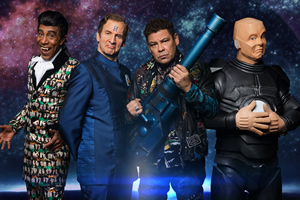Red Dwarf II retrospective: An era defined
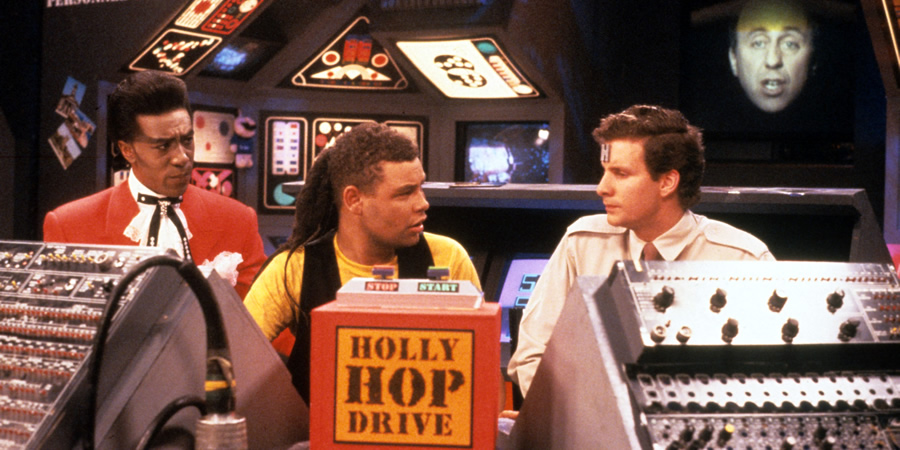
Against all the odds, Red Dwarf had become something of a surprise hit for BBC2 during its first series. With solid viewing figures that hit heights of more than 5 million, the BBC was quick to commission Series II before the first had even finished airing. However, Rob Grant and Doug Naylor, Red Dwarf's creators and sole writers were ever the perfectionists; despite all the iconic scenes that featured in the first series, they made the decision to ask the BBC not to repeat Red Dwarf I. Reflecting on this years later, Doug remarked that it had been the right thing to do, whilst Rob said, "There's an old saying: never judge a series until its tenth episode".
Red Dwarf Series II was broadcast in the autumn of 1988, consisting of six episodes:
Kryten
Better Than Life
Thanks For The Memory
Stasis Leak
Queeg
Parallel Universe
Rob and Doug's quest to make Red Dwarf the best it could be was helped by a slightly bigger budget, allowing for more guest stars and the introduction of Kryten. However, the character was something of a bone of contention between the two writers. Rob Grant was at first reluctant to introduce a robot, feeling that it was all a bit 'predictable' for a sci-fi sitcom. However, Doug managed to convince him that, for one episode, having a robot would be a good move for the show, especially as they'd written themselves into a bit of a corner with their initial 'no monsters or aliens' rule.
Grant and Naylor had previously worked with David Ross on a Radio 4 sitcom called Wrinkles. This 1980s comedy centred around a care home, with Ross playing one of the elderly residents (despite still being in his thirties at the time). Wrinkles was an early showcase for the duo's writing and is still regularly repeated on Radio 4 Extra. It was during the making of the series that Naylor spotted David Ross's talents, commenting that he had been 'supreme' with the audience. Naturally, he became the very first Kryten.
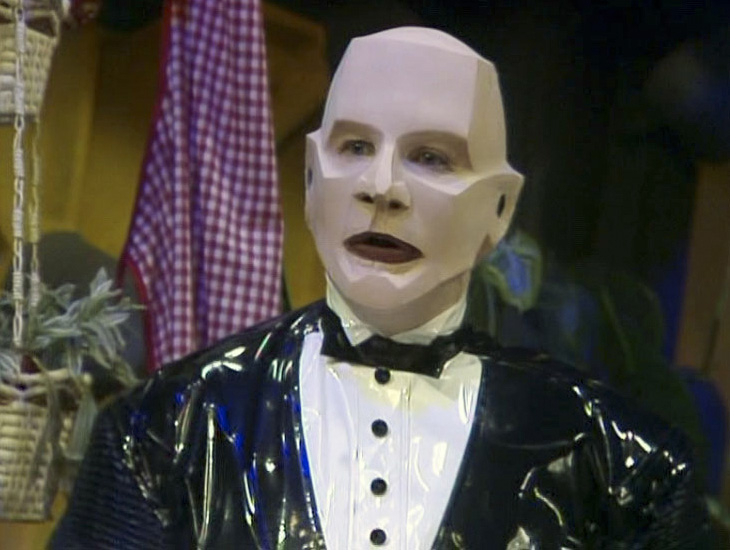
The Kryten episode was a massive turning point for Red Dwarf. Chris Barrie recalled the "skeleton reveal" as the moment when he realised that they were onto something pretty special with the series as a whole. The plot of the episode sees Kryten send out a distress call from his crashed ship, revealing to us that the crew comprises of only himself and three other women. Naturally, Lister, Rimmer and the Cat proceed to spend half of the episode getting ready for this "rescue mission". Lister does regularly remind everyone that they're not "on the pull", yet Rimmer notices that he is wearing all his least "smeggy things".
There's a twist of course: this crew, like the vast majority of the crew of Red Dwarf herself, have been dead for thousands of years. The bewildered robot, Kryten, introduces Lister, Rimmer and the Cat to three skeletons in wigs. It was a reveal that was as momentous to Red Dwarf as Del Boy falling through the bar in Only Fools And Horses.
At the recording of the episode, the cast and crew tried their utmost best to keep the big reveal a secret right up to the last second in order to record the audience's genuine reaction. Unfortunately, and to the despair of producer Paul Jackson, a technical glitch meant that the curtain rose and revealed the set too early, so the true initial reaction of the audience wasn't captured on the recording. Nonetheless, this didn't dampen the reveal as far as viewers at home were concerned. Kryten leaves to make tea as our heroes look on bewildered. On his return he is still oblivious to their very obvious predicament.
KRYTEN: (Noticing the silence) Well, is anything the matter?
RIMMER: Anything the matter? They're dead.
KRYTEN: Who's dead?
RIMMER: (Pointing to the skeletons) They are dead. They're all dead.
KRYTEN: My God! Well, I was only away two minutes!
This was the scene that seemed to change Red Dwarf forever. The show was now balancing authentic science fiction stories with stand-out, traditional sitcom set pieces that mainstream audiences could connect with.
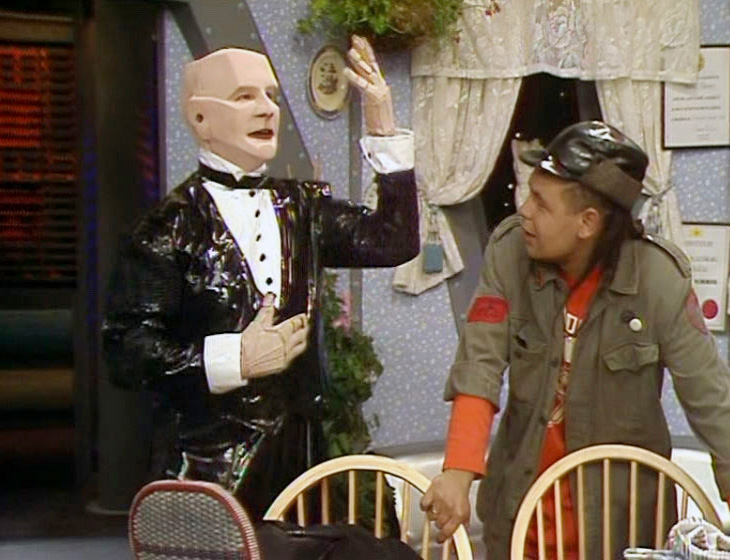
The buzz of excitement around Ross's guest appearance was felt throughout the entire production: so, we ask the question, what prevented David Ross from becoming the permanent Kryten? The answer is that it was a simple clash of dates. Ross was starring in a play at The Old Vic that coincided with the filming dates of Red Dwarf III. He later remarked that although he loved the experience, he struggled enormously with the claustrophobic suit that he had to wear to play the character, something that would later become a significant issue for Robert Llewellyn, who took on the role permanently from Series III onwards.
As far as classic episodes from Red Dwarf II go, Kryten usually comes second only to Queeg, which is not just considered the best episode of Series II, but also frequently polls amongst the top five greatest episodes of the sitcom's entire run to date. Quite something, considering there are now 61 to choose from.
At its heart, Queeg can be considered a Galton & Simpson-style script, with Norman Lovett taking the material completely in his stride. Norman's career was at its peak here, as he eyed up a potential series of his own (which eventually became 1993's I, Lovett).
The episode came together by chance. Lovett had repeatedly requested an episode centred around Holly during Series I, whilst co-incidentally Danny John-Jules had brought his mentor and friend Charles Augins to the Series I wrap party. Shortly after, Rob and Doug decided to write a part for Charles, and opted for a new computer, Queeg.
The episode plays clear homage to the 1954 film The Caine Mutiny. From Hollywood's golden age, the movie saw Humphrey Bogart star as Queeg, a tyrannical captain who takes command over a minesweeper during the Second World War. The crew of the vessel believe he is insane and attempt to overthrow him. Much the same happens with the Dwarfers; it was another case of Grant and Naylor cleverly weaving the plot of a classic film into Red Dwarf.
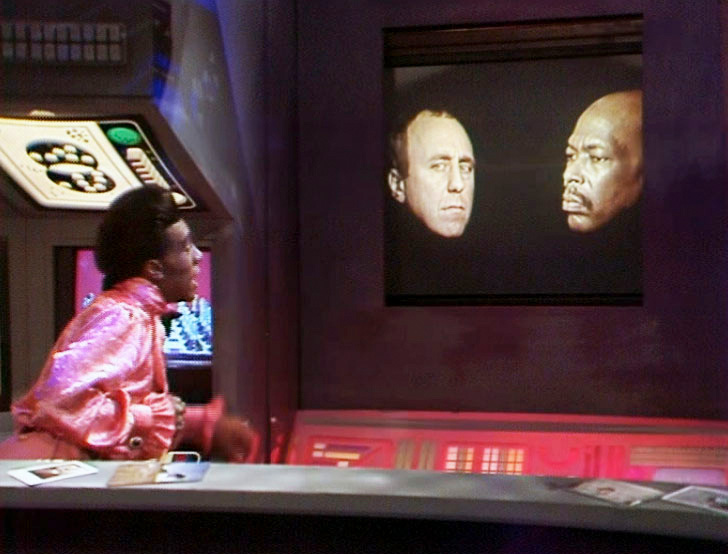
Perhaps the most fascinating fact about Queeg is that the episode's big reveal ('We are talking May, June, July and August fool') wasn't planned. Rob and Doug wrote the entire script right up until Holly lost the chess match, then got writers' block, unable to work out how to re-instate him as the ship's computer and finish the episode. The now-classic conclusion turned the situation on its head and was relatively last minute. Bizarrely, Queeg could now be considered one of the finest plotted sitcom episodes of all-time... albeit unintentionally.
Rob and Doug were displaying incredible sitcom writing talent with this script, and such a lightness of touch in Red Dwarf's poignant moments across the entire series. As Holly bids goodbye to Rimmer for apparently the last time, he says:
And Arnold - well, I hope you meet those aliens you're looking for, who can give you a body, and you become an officer and you get a sex life, and all the other millions of things you feel you need to make you happy.
'... all the other millions of things you feel you need to make you happy'. Not what Rimmer actually needs to make him happy, but what he feels he needs.
Lines like these bring us to the heart of these characters. Thanks For The Memory and Better Than Life explored Rimmer (Chris Barrie) and Lister's (Craig Charles) unique double act in far more dramatic detail, not something that was done that often in sitcoms at the time. It worked so well here, especially during the scene inside the observation deck in Better Than Life. Rimmer's confused grief as he talks about his father is interesting yet not overplayed. Nothing really ever gets too heartfelt. Rimmer and Lister still wish they could be trapped in deep space with almost anybody else, maintaining a mutual understanding that they could never truly enjoy each other's company, because Lister's a bum and Rimmer's such a smeg head.
Which brings us to Tongue Tied! Red Dwarf's first all-out musical number, Rob and Doug wrote the song as an offhand gag with the chorus being incomprehensible (because the singer was literally tongue-tied). The scene was just a little aside to introduce the idea of a dream recorder. However, when Red Dwarf's composer, Howard Goodall, put some music to the lyrics, Danny John-Jules (in the true spirit of his character and with a background in musical theatre) felt inspired to turn the whole thing into a funky, all-singing, all-dancing show tune. Danny later released Tongue Tied as an official single and it reached 17 in the UK music chart.
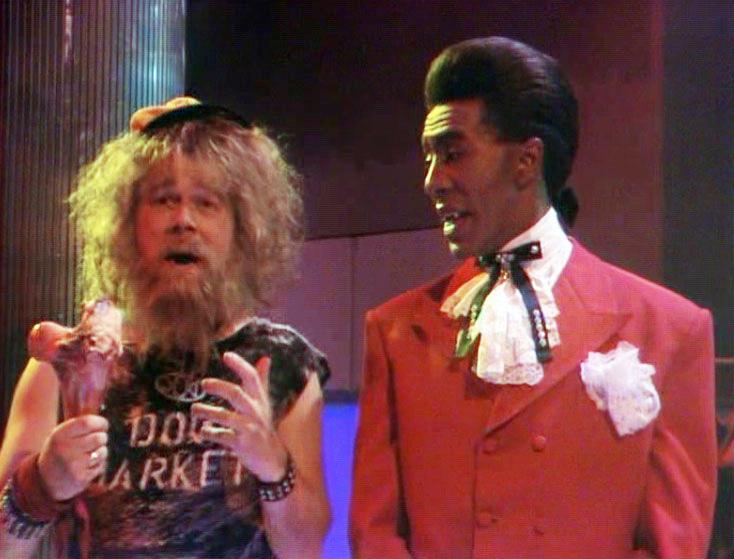
Overall, not much changed between Series I and II. The sets did get a bit less grey and the boys actually left the ship a few times in the newly built Blue Midget space craft. There were also location shoots allowing the Dwarfers to explore whole new landscapes: in Better Than Life the crew were supposed to be in paradise, but it was, in fact, a freezing cold beach in Rhyl in the middle of winter.
The plots became even more challenging than in Series I, both technically and in terms of bold storytelling. Stasis Leak was so complicated to film that most of the cast were apparently left scratching their heads. Ultimately, what Series II did brilliantly was fine tune what had been established in the first series and push ideas further, laying the foundations for Red Dwarf's status as a classic sitcom.
Next time it's all change as Hattie Hayridge takes over as Holly and Robert Llewellyn finally joins the posse to make up the iconic quartet known as 'The Boys from The Dwarf'.
Help us publish more great content by becoming a BCG Supporter. You'll be backing our mission to champion, celebrate and promote British comedy in all its forms: past, present and future.
We understand times are tough, but if you believe in the power of laughter we'd be honoured to have you join us. Advertising doesn't cover our costs, so every single donation matters and is put to good use. Thank you.
Love comedy? Find out moreRed Dwarf - Complete Series I - VIII

For the first time, own the first eight series of the smash hit British comedy on Blu-ray - remastered in high-definition.
Chicken soup machine repairman and intergalactic loser Dave Lister awakes from suspended animation to discover he is the lone survivor of a radiation leak and is now three million years into deep space and the last surviving member of the human race.
Dave is soon joined by Arnold J. Rimmer, a hologram of his dead bunk-mate, a life-form who's evolved from his pet cat and Kryten, a neurotic sanitation mechanoid. Together this unlikely bunch of heroes attempt to find their way back to Earth, under the guidance of Holly, the ship's senile computer. Along the way they'll be brought back to reality, lose their mothership, become stranded on Starbug, bump into Lister's ex-girlfriend and find themselves back on Red Dwarf where the original crew have been resurrected by nanobots.
First released: Monday 14th January 2019
- Distributor: BBC
- Region: B
- Discs: 19
- Minutes: 1,466
- Subtitles: English
- Catalogue: BBCBD0441
![]() Buy and sell old and new items
Buy and sell old and new items
Search for this product on eBay
BCG may earn commission on sales generated through the links above.
Red Dwarf II

The second series of Red Dwarf is, as Danny John-Jules says in the accompanying DVD commentary, "the one where it really went good". This second disc also has a host of fun extras on top of the episodes, including an "A-Z of Red Dwarf", outtakes, deleted scenes, a Doug Naylor interview, model shots, and the full, unexpurgated "Tongue Tied" music video.
First released: Monday 10th February 2003
- Distributor: 2 Entertain
- Region: 2
- Discs: 2
- Minutes: 174
- Catalogue: BBCDVD1118
![]() Buy and sell old and new items
Buy and sell old and new items
Search for this product on eBay
BCG may earn commission on sales generated through the links above.
- Released: Tuesday 2nd May 2006
- Distributor: BBC Worldwide
- Region: 1
- Discs: 2
- Minutes: 180
![]() Buy and sell old and new items
Buy and sell old and new items
Search for this product on eBay
BCG may earn commission on sales generated through the links above.
- Released: Monday 12th September 2016
- Distributor: BBC Worldwide
BCG may earn commission on sales generated through the links above.

